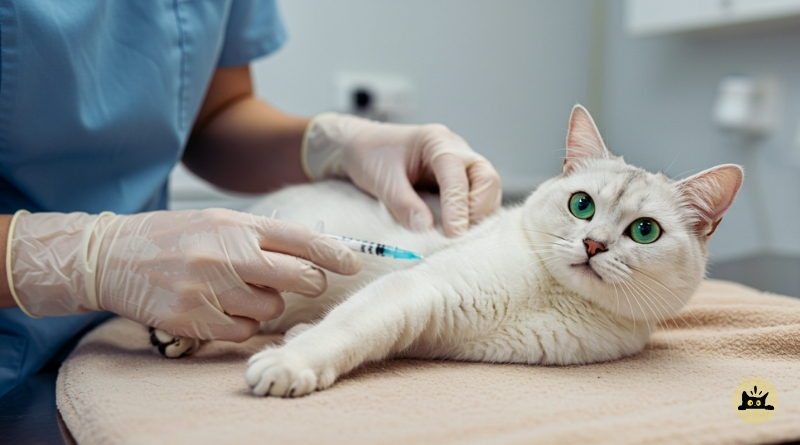Cat Leukemia Prevention is essential for every cat owner. Feline leukemia is a serious illness that affects many beloved cats. Even though it may sound frightening, taking simple, everyday steps can protect your cat and help them live a long, healthy life. In this post, we will explain what feline leukemia is, how it spreads, what signs to look for, and what you can do to keep your cat safe—all in clear, easy-to-understand language.
What Is Feline Leukemia?
Feline leukemia is a virus that causes a type of blood disease in cats. It weakens your cat’s natural defenses so they may get sick more easily from other bugs. Once your cat catches this virus, it usually stays with them permanently. Some cats are able to fight off the sickness and show few problems, but many end up facing issues such as low red blood cell counts or even cancer. Trusted sources such as WebMD Pets explain that keeping your cat safe from this virus is both important and possible.
Recognizing the Signs
Often, a cat with feline leukemia may not show clear signs at first. As the virus makes your cat feel worse, look for simple changes in behavior or appearance:
- Loss of Appetite and Weight Drop: Your cat might start eating less and slowly lose weight.
- Dull, Lackluster Fur: A normally shiny, clean coat may become dull or unkempt.
- Tiredness and Low Energy: If your cat seems more sleepy or isn’t as playful as before, it could be a warning.
- Swollen Bumps Under the Skin: You might notice small, swollen areas around the neck or under the arms.
These signs do not automatically mean your cat has the virus, but if your cat is at risk or you notice unusual changes, it’s best to have them checked by your vet right away.
How It Spreads
Feline leukemia spreads mainly through long and close contact. The virus lives in saliva and other fluids like milk. Sharing food, water, or even grooming with an infected cat can pass on the virus. Since the virus does not live long on surfaces, brief contact is less risky. In general, the longer and closer your interactions with a sick cat, the higher the chance of the virus spreading. Keeping your cat away from unknown or sick cats greatly lowers their risk.
Cat Leukemia Prevention Strategies
Preventing feline leukemia is all about taking simple steps each day:
- Keep Your Cat Indoors: Cats that stay indoors have a much lower chance of encountering the virus. If you want your cat to enjoy fresh air safely, consider creating a secure area like a catio.
- Test New Pets: Before adding a new pet to your home, make sure the newcomer is checked for the virus. This small step helps keep your home safe.
- Vaccination: Talk with your vet about vaccinating your cat. Although the vaccine does not offer full protection, it lowers the risk of infection or at least makes the illness less severe if exposure happens.
- Good Daily Habits: Wash your cat’s food and water bowls regularly and avoid letting them share these with other cats. Keeping an eye on your cat’s behavior and appearance helps catch any problems early.
What to Do If You Suspect Exposure
If you think your cat may have come in contact with the virus—for example, after a fight with another cat or spending time near a sick pet—it’s important to act quickly. Make an appointment with your vet right away. Early testing and care can help reduce the impact of the virus and keep your cat healthier. Even if the test shows the virus, many cats can still enjoy a good quality of life with proper care.
Working with Your Vet
Your vet is your most important partner in protecting your cat. They can plan regular check-ups to spot any signs of illness early and advise you on the best times for testing—especially if your cat spends time outdoors or lives with other cats. By working together, you can set up a routine that includes vaccinations, frequent check-ups, and extra care if something seems off. Open and caring communication with your vet is key to keeping your cat healthy.
Conclusion
Feline leukemia is a challenging condition, but by taking simple, everyday steps, you can help keep your cat safe from the virus. Keeping your cat indoors, testing new pets before they join your family, getting vaccines as needed, and practicing good home habits all contribute to a healthier life for your furry friend. Always be alert to any changes in your cat’s behavior or appearance, and do not hesitate to call your vet if you have any concerns. Every little precaution you take makes a significant difference in protecting your cherished companion. Your consistent care, no matter how small, adds up to a safer and happier life for your cat.
Sources : WebMD Pets, World Small Animal Veterinary Association, British Small Animal Veterinary Association (BSAVA)
You may also enjoy another post in this category: Cat Heartworm Disease Prevention Tips

